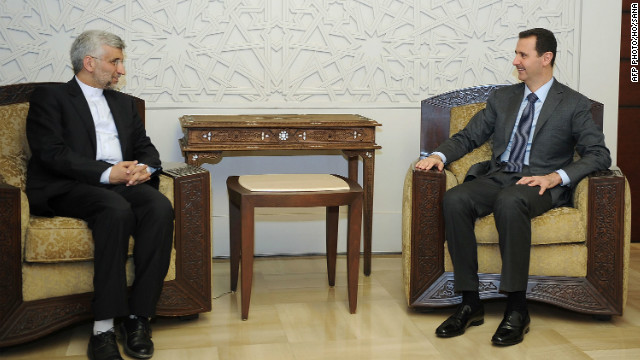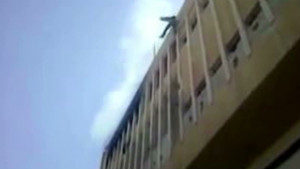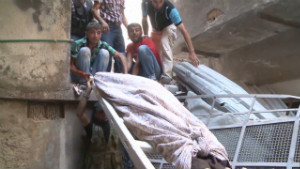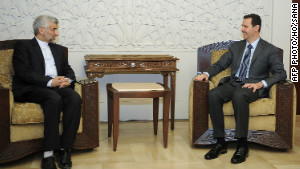Why is Iran supporting al-Assad?http://edition.cnn.com/2012/08/08/world/syria-iran-analysis/index.html?eref=edition
9:07 AM - 14 Aug 12 via Paijwar Innovation · Details
What does Iran get for supporting al-Assad?
By Tim Lister, CNN
August 14, 2012 -- Updated 0024 GMT (0824 HKT)

Syrian President Bashar al-Assad, right, meets with a top aide to Iran's supreme leader in Damascus on Tuesday.
STORY HIGHLIGHTS
- Iranians have cast Syria conflict as broad ideological battle
- Iran probably knows what Bashar al-Assad is thinking, expert says
- Al-Assad is trying to cling to power during a 17-month uprising to oust him
- Iran cares because Syria is main conduit to Hezbollah which can get at Israel
(CNN) -- In public at least, the message was defiant. Beleaguered Syrian President Bashar al-Assad, sitting alongside Iran's intelligence chief, proclaimed Tuesday "the determination of the people and government of Syria to cleanse the country of terrorists."
His Iranian visitor, Saeed Jalili, responded, "What is happening in Syria is not an internal issue but a conflict between the axis of resistance on one hand and regional and global enemies of this axis on the other." Jalili's comment was made public by the Syrian news agency that al-Assad's government runs.
It's a familiar theme for the Iranians, who have cast events in Syria as part of a much broader ideological battle. Supreme Leader Ayatollah Ali Khamenei has similarly characterized events in Syria as a "war between the front of hegemony and the front of resistance."
Ayham Kamel of Eurasia Group believes the Iranians must be alarmed that the tide is running fast against al-Assad.
 Shelling haunts Syrian family
Shelling haunts Syrian family Syrians being tossed off buildings?
Syrians being tossed off buildings? Life and death in Aleppo
Life and death in Aleppo Syrian refugee numbers rise amid violence
Syrian refugee numbers rise amid violence Syrian president meets with Iran envoy
Syrian president meets with Iran envoy"Iran probably has excellent information regarding Assad's position. That information would make clear that Iran is increasingly likely to lose its only ally in the region, greatly reducing its strategic reach," he says.
The last thing Iran wants is a Sunni-dominated Syria that abandons the "axis" -- especially as the rebels' main supporters are Iran's Persian Gulf rivals: Qatar and Saudi Arabia.
"How can those who have never held an election in their country be advocates of democracy?" Jalili asked in Damascus, with a less than oblique dig at the Gulf monarchies. Assad also blasted as "unacceptable" that certain foreign countries were "supporting terrorism in Syria" through arming the rebels.
Iran is al-Assad's last regional ally, and Western intelligence officials believe the Islamic Republic has provided technical help such as intelligence, communications and advice on crowd control and weapons as protest in Syria has morphed into resistance.
A United Nations panel reported in May that Iranian weapons destined for Syria but seized in Turkey included assault rifles, explosives, detonators, machine guns and mortar shells.
Iran's Foreign Minister acknowledged Wednesday that some of the 48 Iranians kidnapped last weekend by the Free Syrian Army near Damascus were former military personnel.
"Some retired individuals from the (Revolutionary) Guards and army were dispatched to Syria to make a pilgrimage," Foreign Minister Ali Akbar Salehi told the official Iranian news agency, a statement that will likely be seized upon by the rebels as confirmation that Iran is directly aiding the al-Assad regime.
Syria and Iran vs. Israel
Syria also matters to Iran because it is the main conduit to the Shi'ite militia Hezbollah in Lebanon, the proxy through which Iran can threaten Israel with an arsenal of short-range missiles.
In 2009, the top U.S. diplomat in Damascus disclosed that Syria had begun delivery of ballistic missiles to Hezbollah, according to official cables leaked to and published by WikiLeaks.
"Syria's actions have created a situation in which miscalculation or provocative behavior by Hezbollah could prove disastrous for Syria and the broader region," the diplomat wrote.
The regional picture that was so favorable to Iran a few years ago -- as events in Iraq moved in its favor and those in neighboring Afghanistan moved against the Western alliance -- is now much more challenging. International sanctions imposed chiefly by the United States and Europe are biting, renewed political violence is destabilizing Iraq, and Iran's relationship with Turkey has eroded badly.
Not so long ago, Iran and Turkey were on good terms. The government of Recep Tayyip Erdogan tried to be the honest broker in Iran's confrontation with the West over its nuclear program; both governments worried about Kurdish separatism; and Turkey's guiding principle was 'zero problems with neighbors.'
Erdogan said this week at a meeting of his Justice and Development Party: "When no one else was by its side, Turkey stood by Iran, despite everything. Turkey defended its right to nuclear energy."
Not any more. Erdogan has been infuriated by Iran's attempts to paint Turkey as conspiring with the West on Syria. This week, Iran's chief of staff Hassan Firouzabadi accused Turkey of helping the "belligerent objectives" of Western powers, prompting the Turkish Foreign Ministry to condemn "groundless accusations and extremely inappropriate threats" of Iranian officials.
Erdogan joined in. "On Syria, once again I ask the Iranians: Does defending a regime that kills its brothers, and I think it has reached 25,000 by now, suit our values?"

